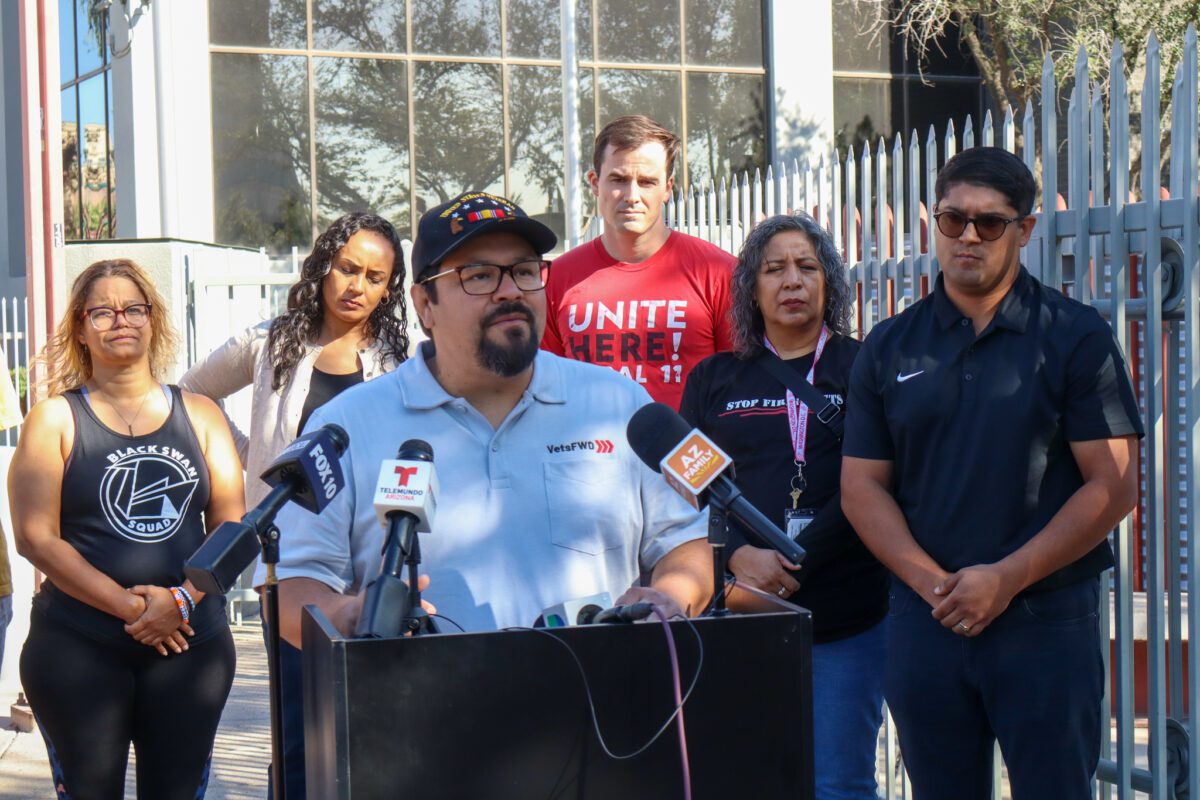
Ricardo Reyes speaks at a rally outside the downtown Phoenix ICE office following news of the deportation of Army Sgt. Jose Barco, a Purple Heart recipient, on Nov. 14. Sahara Sajjadi/The Copper Courier
Sgt. Jose Barco was deported to Mexico after a months-long battle to stay in the US.
Nov. 11 was Veterans Day, on which we honored more than 15 million US veterans. But for Army Sgt. Jose Barco, a Purple Heart recipient, it marked the 21st anniversary of a traumatic incident he survived in Iraq, when his Humvee was struck by an improvised explosive device (IED), went airborne, and burst into flames.
Now, that date holds even more heartbreak for Barco. On Nov. 11, 2025, he was moved to a detention center in Florence, where he braced for deportation after nearly a yearlong battle.
Advocates, veterans and community leaders gathered outside the Immigration and Customs Enforcement (ICE) field office in downtown Phoenix on Nov. 14 after news broke that Barco had been deported early Friday morning to an unknown country.
“Deported veterans should not even be in a sentence,” state Rep. Cesar Aguilar said. “When you serve this country, you should be an American citizen, and you should be given some sort of legal status in this country.”
Barco came to the US from Venezuela at age four as a political refugee, according to Support Jose Barco, a website advocating on his behalf. He grew up in America and enlisted in the US army at age 17 under a “Soldier to Citizen” contract, the website said.
Individuals who serve in the US armed forces for at least one year are eligible to apply for naturalization. Barco began the process of naturalizing his citizenship, but his paperwork was lost.
During his time of service, a vehicle exploded and Barco was flung through the air and thrown against a wall. Barco ran to the scene to assist two fellow soldiers who were pinned under the vehicle, according to Ricardo Reyes, executive director of Vets Forward, a veterans advocacy group.
“It was described by his fellow soldiers that his whole body was on fire as he was lifting this vehicle,” Reyes said.
Barco was awarded a Purple Heart, a US military honor awarded to service members who were wounded or killed in action, after this incident.
At the time, Barco was treated for burns and a lacerated lip at Brooke Army Medical Center, but no treatment for a traumatic brain injury (TBI), according to NPR. A few months later, Barco noticed ringing in his ears, and doctors at Fort Carson realized he had a head injury from incident, according to Frontline.
Despite being told by doctors his injuries qualified him for honorable medical retirement from the Army, which would grant him lifelong pension and free healthcare from the Department of Veterans Affairs, Barco was keen on returning to his unit.
“This man is a hero. This is the type of people that we want, and I understand that he made a mistake, but he paid his debt to society,” Reyes said. “We are asking that he just be allowed to go back to his family and rebuild his life.”
In 2007, Barco returned home. By then, his TBI symptoms increasingly worsened after witnessing more explosions in Iraq. He was prescribed a number of drugs to tend to his mental health issues, which did not help, according to NPR. He was discharged in 2008 at the age of 23. That April, Barco was driving past a house party in Colorado Springs and shot into a crowd of teenagers. He struck a pregnant 19-year-old Ginny Clemens.
Barco told NPR he has no memory of what happened. He was later charged with two counts of attempted first-degree murder and one count of menacing and sentenced to 52 years in prison.
After 15 years in prison, he was released early for good behavior on Jan. 21, 2025 — just a day after President Donald Trump was sworn into office and the start of Trump’s crackdown on immigrants.
Reyes said Barco is apologetic for his crimes and has done his time. As a fellow veteran, Reyes faults the government for failing to get Barco the help he needed with his post-war trauma, and attributes Barco’s crime to his untreated health conditions. Reyes urged the Trump administration to express sympathy for veterans.
“I had trouble adjusting to civilian life. I can only imagine everything he [Barco] went through. Going to war, going through this incident – where he was basically blown up and then burned alive trying to save his fellow soldiers. I can only imagine how horrible his PTSD, his depression, must have been.”
Release and immediate capture by ICE
Barco was hopeful for a fresh start, but upon leaving prison in Colorado, he was apprehended by ICE agents. Since then, he has been shuffled between different facilities in Colorado and Texas.
In April, he was put on a plane back to his home country of Venezuela. During a stop in Honduras, authorities refused to take in Barco, believing Barco’s birth certificate was fake and that his accent sounded too Cuban, according to NPR. He was returned to El Valle Detention Center in Texas, according to his team.
On Veterans Day, he was transferred to a detention center in Florence, Arizona, according to his lawyer, Kevin Thomas O’Connor Jr.
In the early hours of Nov. 14, Barco was deported to an unknown location, according to Reyes, who said the family was hoping he wasn’t sent to Venezuela or Cuba, where Barco worried for his safety, or to countries in Africa as the Trump administration expands third-country deportations.
Reyes said the family received an alert stating Barco was deported but no word from Barco. When they checked the ICE detainee locator online, his name had disappeared.
A spokesperson for ICE told The Copper Courier that Barco had been deported to Nogales, Mexico. Barco’s wife and 15-year-old daughter, whom he has never met outside prison, remain in the US, according to Reyes.
Barco is one of a number of veterans who have been deported by the Trump administration. Earlier this year, President Trump rescinded a Biden-era memo that instructed ICE to take into account an immigrant’s military service and not to initiate removal proceedings if they are eligible for naturalization, unless “significant aggravating factors,” were present.
In June, lawmakers penned a letter to Department of War Sec. Pete Hegseth demanding answers on the deportation of veterans, citing estimates that more than 10,000 have been deported.
“It is essential that our nation uphold its commitment to the men and women who have and are bravely serving in the armed forces,” lawmakers wrote.
Reyes said he and other advocates plan to continue assisting the family and to keep fighting against the Trump administration’s deportation of US veterans.
“[The] Trump administration [doesn’t] really care about veterans, about our service,” Reyes said. “Instead of helping us, they deported him. That is a betrayal to people who took an oath to fight for this country.”

Want to give back? Check out these coat drives near Phoenix
For the first time since 2010, the poverty rate in America shot up dramatically in 2022, according to data from the Census Bureau. That means more...

GameStop is letting you trade in almost anything. Here’s how in Arizona
Those who grew up in the 90s and early 2000s remember the days where you'd gather all of the old games you didn't play anymore - maybe even an...

Boycott Bar food drive: Community serves up mutual aid in response to SNAP cuts
PHOENIX – The lights of Boycott Bar’s patio switched on, and married couple Marley DeGroodt and Jocy Suarez, two of the bar’s employees, immediately...

Why health insurance is so expensive this year—and what you can do about it
Michelle Andrews November 4, 2025 This year’s Obamacare open enrollment period, which started Nov. 1 in most states, is full of uncertainty and...





